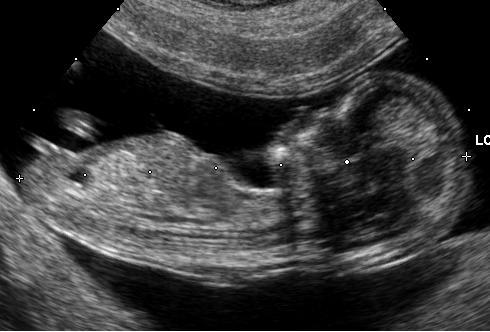The Newest Edition to the Fight Against Roe v. Wade – Iowa’s “Heartbeat Bill”

Ultrasound of the embryo at 12 weeks via Wikimedia Commons
On May 4, Iowan governor Kim Reynolds signed legislation Senate Bill (SB) 359, popularly known as “the heartbeat bill.”The bill, due to go into effect on July 1, is currently the strictest abortion ban in the United States.
Bill 359 prohibits physicians from performing an abortion without testing for a fetal heartbeat. The detection of such a heartbeat could occur as early as six weeks into the pregnancy — though such a timeline is not explicitly mentioned in the bill. However, many individuals who can get pregnant are unaware of even being so up until this time.
In the case that a heartbeat is detected, the patient is denied access to abortion unless it is deemed medically necessary or if there is a medical emergency. The bill’s definition of “medical emergency“ encompasses physical illness, disorder (although it does not clarify the term disorder), or danger posed to the parent’s life. However, it does not include psychological, familial, or emotional conditions. Meanwhile, “medical necessity” is inclusive of pregnancy due to rape and incest but limits the number of days the pregnant individual has to report these incidents and be eligible for abortion.
Though supporters of the bill champion it for standing up for the rights of the unborn child, it is both highly restrictive and unconstitutional. This is evident in the conditions it imposes upon the survivor to report rape and incest, with no regards for the resources available to them. One is required to report rape within 45 days, and incest within 140 days to a law-enforcement or a health agency. This might not be feasible for all the survivors, and they are then consequently left with raising a child against their desires. Apart from these constraints, the bill also fails to consider the financial and emotional ability of the parent-to-be to raise their child.
Further, as the New York Times reports, “of 3,722 abortions performed in the state in 2016, 347 of them occurred before six weeks of pregnancy.” This amounts to less than ten percent of total abortions. This small percentage indicates the rarity of seeking an abortion before six weeks of pregnancy and shows the negative effect Bill 359 would have on the majority of pregnant patients who seek abortions after six weeks.
Senate Bill 359 blatantly disobeys the U.S. Supreme Court decision of 1973, Roe v. Wade, that recognizes an individual’s constitutional right to abort, as well as subsequent decisions in 1992 (Planned Parenthood v. Casey) and 2016 (Whole Woman’s Health v. Hellerstedt). Currently, this right can be exercised until the time that the fetus is viable outside the womb – 24 weeks or later into the pregnancy.
However, the Iowan bill is hardly the first of its kind. It follows many other attempts to restrict abortion. For instance, in March 2018, a bill was passed in Mississippi which sought to end most abortions after the 15th week of pregnancy, but it was temporarily blocked by a U.S. District Judge. In 2013, North Dakota and Arkansas had passed laws that were also tied to the detection of the fetal heartbeat. These were all later struck down.
Apart from these stringent measures, others have sought to slowly chip away at the 24 weeks ruling by considering the “fetal pain” theory. The proponents of this theory assert that fetuses can feel pain at 20 weeks. However, the science on this is far from conclusive. While, the United States Senate rejected a bill in early 2018 that would ban abortions after 20 weeks, a few states have adopted legislation on these lines, thus indicating that there is a continuing debate on overturning the status quo.
This debate has gained traction since President Trump took office. With the ability of this administration to bias the Supreme Court towards the conservative point of view, many states are emboldened to pass stricter abortion laws. Steve King, a pro-life House Representative from Iowa who sponsored the federal “Heartbeat Protection Act” back in January 2017, argued that the purpose of writing the bill was to challenge the viability standards set by the Supreme Court. The bill, if passed, would have reached the court in time for the next appointment that is likely to be conservative leaning. 19 states adopted 63 restrictions on abortions in 2017, the highest number since 2013. Further, the increase in the number of such laws appears to be due to states engaging in a rat race to get their name on the case that eventually overturns Roe v. Wade.
While Planned Parenthood and the American Civil Liberties Union (ACLU) are taking the Iowan SB 359 to court, it is important to look at the larger picture. Abortion laws have been under attack for a long time, beyond just the current federal administration. Although, legislation restricting the right to abortion might currently have passed only in a few states, taking this fight to the national level and challenging it in federal courts sets a precedent.
Such a precedent could potentially be dangerous in the message it sends across to individuals regarding their rights. It is undeniable that people across the nation have the right to bodily autonomy beyond mortal danger, rape, and incest. Hence, it is imperative that we stay vigilant and speak out against such laws even when they aren’t in our states of residence.




